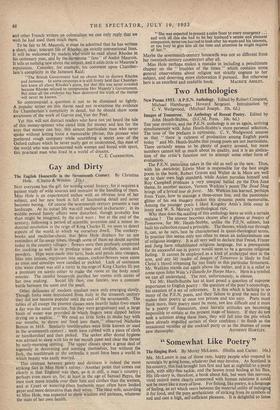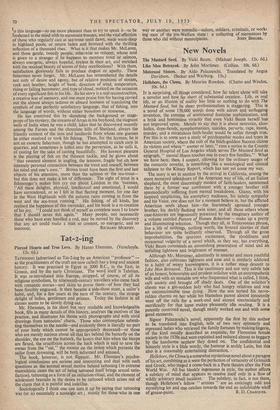" Somewhat Like Poetry
The Singing Reel. By Moray McLaren. (Hollis and Carter. 16s.)
MR. MCLAREN is one of those rare, happy people who respond to nostalgia by going home, whatever that may involve. As Scotland is his country, this had bropght him first and last at nightfall to a peaty loch, with silky-fine tackle, and the brown trout boiling at his flies. His life-story is, therefore, a book about fish, but were this nervous, vivid record more clearly concerned with human relations it could not be more like a story of love. For fishing, like poetry, is a language of feeling, an art which veers between the material utility of indulging it for food, and the pure aestheticism of striking from its symbols of rod and cast a high, self-sufficient pleasure. It is delightful to listen to this language—to me more pleasant than to try to speak it—to be freshened in the mind with its mountain breezes, and the vital affection of those who regularly cast at sea-trout until dawn, wade waist-deep in highland pools, or return laden and bronzed with the thrilling reflection of a thousand rises. What is it that makes Mr. McLaren, and those gentle, tweedy people, otherwise so reticent, whose soul is given to a stranger if he happens to mention trout or salmon, always energetic, always hopeful, tireless in their art, and enriched with the residual beauty of scores of fishy recollections? With them, satisfaction gloriously fails to produce disgust or apathy. These fishermen never forget. Mr. McLaren has remembered the details not only of desire and agony, but of relative positions of stream, rock and heather, height of bank, direction of wind, temperature, rising or falling barometer, and type of cloud, noticed on the occasion of every significant fish in his life. So his story is a real reconstruction, a creative feat of memory, and one must praise him for having carried out the almost always tedious or absurd business of translating the symbols of one perfectly satisfactory language, that of fishing, into the language of words, without either boredom or nonsense.
He has contrived this by sketching the background or stage- props of his mystery, the streams of Arran in his boyhood, the stagnant wells of India when he was a child, lakes that he discovered recently among the Farces and the chocolate hills of Shetland, always the friendly context of the inns and landlords from whom one guesses he either received or took his fishing. Then, for the layman, he is not an esoteric fisherman, though he has attempted to catch carp in quarries, and sometimes is lulled into the perversion, as he calls it, of casting for the sake of casting beautifully. His keenest pleasure is the playing of fish on the thinnest tackle, and he glows about "that sweetest element in angling, the tenuous, fragile but oh how intensely personal connection between the trout and oneself, between his mind and one's own." Brown trout have been the first and last objects of his attention, more than the salmon or the sea-trout- but this does not make a lot of difference. The sight of trout in a fishmonger's makes him cry out about London in the 'twenties, "All these delights, physical, intellectual and emotional, I would have surrendered, or so 1 felt in that fleeting moment, for one day in the West Highlands with the autumn rains coming in from the west and the sea-trout running." His fishing, of all kinds, has realised the happiness of this surrender, and his book is a re-creation of his joy. "I could not think of myself as complete were Ito know that 1 should never fish again." Many people, not necessarily those who have ever handled a rod, may be moved by the discovery that any art could make a man so content, so energetic, and so



































 Previous page
Previous page